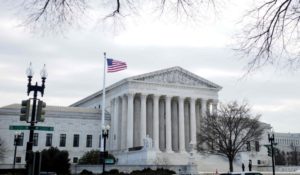
The USDA announces new school nutrition standards, a federal judge strikes down a gun ban for marijuana users, and more…
IN THE NEWS
- The U.S. Department of Agriculture (USDA) announced plans to improve school meal nutritional standards. USDA outlined in its plan that it intends to limit the amount of added sugar in school meals to fewer than 10 percent of a student’s weekly calories. USDA stated it will implement its new standards over a multi-year period starting in fall 2024. For example, USDA plans on reducing added salt in school breakfasts and lunches by 10 percent by 2025 and an additional 10 percent by 2027. Agriculture Secretary Tom Vilsack explained that school meals are important “for giving kids access to the nutrition they need for a bright future.”
- A federal judge in Oklahoma ruled that a federal law prohibiting people who use marijuana from owning firearms is unconstitutional for violating the Second Amendment. The judge emphasized that although the government can prevent dangerous felons from possessing guns, a person’s “mere status as a user of marijuana” does not justify the government taking away the right to possess a firearm. The judge explained the differing approaches by noting that the law does not fall within permissible gun regulations, which typically only take away a person’s right to firearm possession if they have previously engaged in violent, forceful, or threatening conduct.
- A federal judge has allowed construction of a lithium mine in Nevada to begin, rejecting claims from conservationists and Native tribes that the project would cause unnecessary harm to the environment and would destroy a sacred Native American site. The court also held that the Bureau of Land Management needed to revisit whether the mining company had the right to bury waste on land adjacent to the mine but did not otherwise block the project. The Biden Administration had previously approved a permit for the Nevada-based lithium mine as part of its ongoing efforts to produce raw materials for electric vehicle batteries.
- The U.S. Department of the Treasury updated vehicle classification standards used by the Internal Revenue Service to determine the price limit of vehicles eligible for the clean vehicle tax credit. Under the Inflation Reduction Act, taxpayers may qualify for a $7,500 credit for the purchase of an eligible van, SUV, or pickup truck that costs up to $80,000 or the purchase of any other eligible vehicle, such as a sedan, up to $55,000. The Treasury Department revised the standards to be consistent with existing standards used by the U.S. Environmental Protection Agency to determine fuel efficiency classifications. The Treasury Department stated that using a consistent standard will “make it easier for consumers to know which vehicles qualify.” Under the revised standards, certain crossover vehicles, such as those that share characteristics of both an SUV and a sedan, may now qualify for the $80,000 price cap.
- The U.S. Securities and Exchange Commission (SEC) proposed a rule that would prohibit the agency’s employees from investing in funds that concentrate investments “in entities directly regulated” by the SEC. Under current rules, the SEC prohibits employees from owning financial interest in an entity that the SEC directly regulates but does not prohibit employees from owning financial interest in pooled investment vehicles, such as mutual funds. The SEC stated that funds that concentrate investment in SEC-regulated entities “pose a substantial risk of conflicting with SEC work.”
- The U.S. Department of Housing and Urban Development (HUD) proposed new procedures to strengthen the agency’s fair housing planning programs. Under the Fair Housing Act, HUD provides financial assistance to states, local governments, and other recipients to identify causes of housing disparities, take action to eliminate those disparities, and monitor results. Under the proposed procedures, HUD would require program recipients to solicit input from a broad range of community members and conduct annual progress evaluations.
- New York City Mayor Eric Adams announced that New York City will end its coronavirus vaccine mandate for city workers, which had required city employees to receive a single-dose or two-dose coronavirus vaccine. In addition, visitors to New York City Department of Education school buildings will no longer be required to show proof of vaccination. The announcement stated that although the city fired roughly 1,780 city workers for not complying with the mandate, the city will not reinstate anyone automatically, and instead workers must reapply for their old jobs.
- A federal court upheld New York City’s rent stabilization law, which limits landlords’ abilities to increase rent and evict tenants. A landlord trade group had challenged the law, claiming that the law’s limits violated the Fifth Amendment’s requirement that the government pay fair market value if it seizes private property for a public purpose. In affirming the constitutionality of the law, the court stated that “legislatures enjoy broad authority to regulate land use without running afoul of the Fifth Amendment’s bar on physical takings.”
WHAT WE’RE READING THIS WEEK
- In an article in the Boston Review, Louise Melling, Deputy Legal Director at the American Civil Liberties Union, argued that recent U.S. Supreme Court decisions concerning religious liberty undermine state and local antidiscrimination laws. Melling pointed to cases such as Fulton v. City of Philadelphia, in which the Court ruled that an antidiscrimination law requiring a Catholic organization to place foster children with same-sex couples violated the Free Exercise Clause of the First Amendment. Melling predicted that the Court will soon hold in 303 Creative LLC v. Elenis that a Christian website designer has the right to refuse creating wedding websites for same-sex couples even though this right to refuse service to same-sex couples violates Colorado antidiscrimination law. Melling concluded that “in every Supreme Court case in the last decade involving religious resistance to an equality norm, equality has lost.”
- In a recent Urban Institute report, Kathryn Reynolds, policy associate at the Urban Institute, and her coauthors identified key practices for landlords to prevent evictions and remain financially stable. Reynolds and her coauthors proposed that landowners use clear and accessible communication through all stages of tenancy, allow flexibility in payment, and remove barriers for tenants in their housing searches. Reynolds and her coauthors also recommended that rental housing investors only invest in landowners that support tenant well-being and housing stability.
- In a Center for American Progress report, Jill Rosenthal, director at American Progress, and Marquisha Johns, associate director at American Progress, examined the role that the U.S. Department of Health and Human Services’(HSS) Office of Climate Change and Health Equity can play in addressing environmental and climate hazard health disparities. Rosenthal and Johns argued that the Office should track the health impacts of climate change, disseminate information on the connections between climate change and health, and monitor the health care industry’s efforts to reduce greenhouse gas emissions. The Office should also coordinate HHS climate actions with other federal agencies and leverage their respective expertise, Rosenthal and Johns suggested.
EDITOR’S CHOICE
- In an essay in The Regulatory Review, Paul Heaton, director at the Quattrone Center for the Fair Administration of Justice, argued that an independent agency modeled after the National Transportation Safety Board (NTSB) could help reduce police violence. Heaton explained that scholars have praised NTSB, an agency that investigates transportation accidents, as a model for how to reduce risk due to its transparency in its investigative procedures and its ability to aggregate data from many isolated incidents. Since a weakness in the current approach to preventing police killings is that investigators compartmentalize data at the local level, Heaton suggested that a new, independent agency could adapt NTSB’s practices in order to address concerns about police brutality better.



